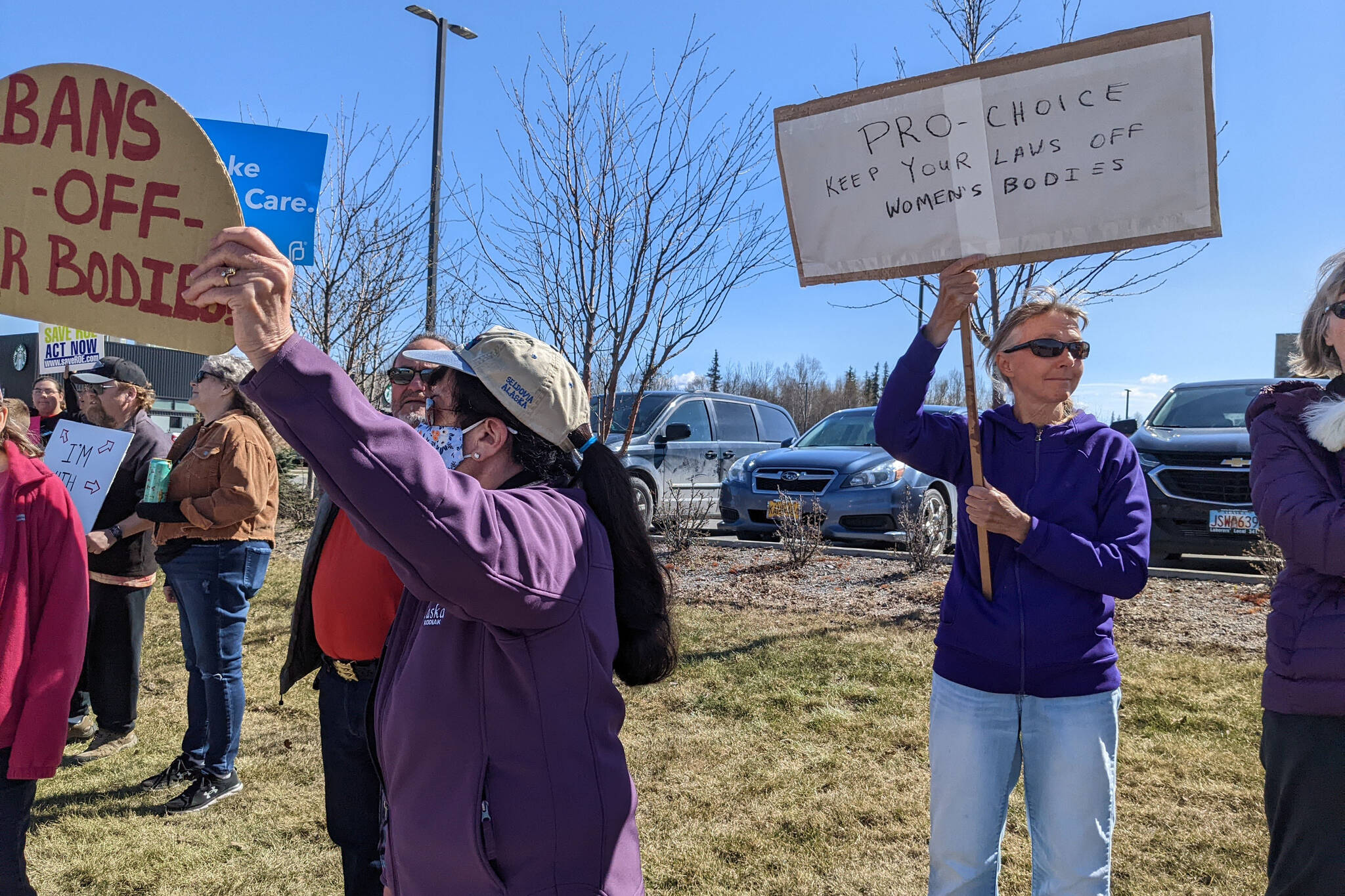The leak of a draft U.S. Supreme Court opinion suggesting that the nation’s highest court plans to overturn abortion rights established in the landmark 1973 case Roe v. Wade continues to reverberate throughout the country. The draft opinion, written by Justice Samuel Alito, was first published by Politico on May 2 and says clearly the court holds Roe and the subsequent case Planned Parenthood of Southeastern Pennsylvania v. Casey, “must be overruled.”
Public backlash to the leaked draft opinion was swift, with demonstrators almost immediately gathering outside the Supreme Court and in other cities around the country, including in Alaska. The day after the draft opinion was made public, hundreds rallied in Anchorage, others in Juneau.
On May 7, four days after the draft opinion was leaked, around 60 people could be seen at the intersection of the Kenai Spur and Sterling Highways in Soldotna, holding signs and advocating for abortion rights. Spread out across all four corners of the intersection, demonstrators were given thumbs up through windshields and intermittent honks of support.
Michele Vasquez helped organize the demonstration and protested at the “Y” on Saturday.
“We started talking and said, ‘We need to hit the streets,’” Vasquez said.
Vasquez, 63, said she was in high school when the original Roe v. Wade verdict was handed down in 1973. Reading the draft opinion that came out last week filled Vasquez with “absolute rage,” she said.
“I knew it was coming, but just the shock of it and reading the things that are put in the (draft) opinion just made me almost physically ill,” Vasquez said. “I cannot believe that we’re going backward instead of keeping the status quo.”
Vasquez said she wasn’t surprised because former U.S. President Donald Trump was “specific” about selecting justices for the U.S. Supreme Court who would vote to overturn Roe v. Wade. She’s not optimistic about what the future holds, saying that while she will fight “as hard as we can” to prevent Roe from being overruled, she is skeptical about what action Congress will take.
Vasquez said she isn’t necessarily worried about what will happen to abortion in Alaska because it was deemed legal prior to when the Roe ruling was handed down. Rather, she’s concerned about women and girls in other states for whom Roe’s overturn would mean a near-total ban on abortion.
“I’m just enraged that I have to do this again,” Vasquez said. “In 2022.”
Numerous states have enacted “trigger laws,” or laws that go into effect if Roe v. Wade is overturned by the U.S. Supreme Court. That’s in addition to states that have already banned abortions, such as Texas and Georgia, which ban abortions after six weeks.
Currently up for consideration by the U.S. Supreme Court is Dobbs v. Jackson Women’s Health Organization, a case out of Mississippi. The state passed in 2018 the “Gestational Age Act,” which prohibits abortions, with little exceptions, after 15 weeks’ gestation age. That’s per Oyez, a digital project out of Cornell University’s Legal Information Institute, Justia and the Chicago-Kent College of Law.
Jackson Women’s Health Organization is the only licensed abortion facility in Mississippi — the lawsuit was filed by the clinic and one of its doctors challenging the Gestational Age Act, according to Oyez. A district court prohibited Mississippi from enforcing the law because it said the state did not provide evidence that a fetus is viable at 15 weeks, per Oyez. Supreme Court precedent prohibits state abortion bans prior to viability.
The question currently before the Supreme Court through the case is whether the Mississippi law is unconstitutional.
An analysis of abortion access in Alaska post-Roe conducted by the Anchorage Daily News last December found that abortion access would likely remain unchanged in the state if the U.S. Supreme Court overturns Roe v. Wade. Privacy protections described by the Alaska Constitution as well as rulings by the Alaska Supreme Court, the ADN reported, “will preserve abortion access here.”
Efforts are underway, however, to call a state constitutional convention, through which parts of the Alaska Constitution could be rewritten. Alaska voters will decide in November whether a constitutional convention will be held.
Study results published last week by the Pew Research Center show that a majority of American adults say abortion should be legal in some cases but illegal in others. The survey included about 10,441 U.S. adults who were surveyed between March 7 and March 13.
Pamela Loyd, of Sterling, also joined the Soldotna protest on Saturday. She described feeling devastated and angry after hearing about the draft opinion.
“What are we doing?” Loyd said. “Why are we going backwards? There’s 80% of America (that) thinks abortion is OK, it should be legal and safe. Nobody wants to go back to wire hangers.”
Loyd said she’s previously demonstrated in support of abortion rights, including in Anchorage and on the Kenai Peninsula.
“I don’t know why we have to keep doing this over and over again,” Loyd said. “Why do we keep going backwards? (It’s) just a bunch of old white guys trying to maintain their status and pushing women around because they think women are less than. And we’re not.”
Reach Ashlyn O’Hara at ashlyn.ohara@peninsulaclarion.com.
Clarion Editor Erin Thompson contributed to this report.

